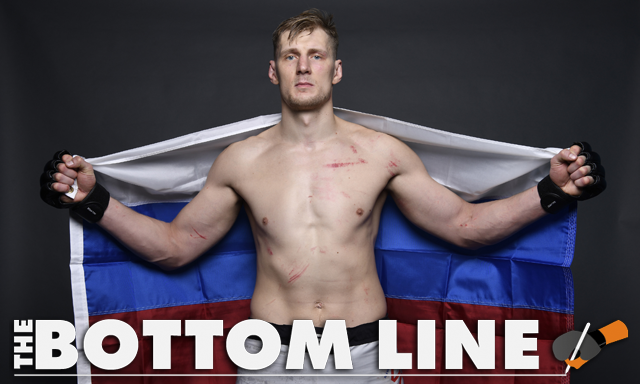
Editor’s note: The views and opinions expressed below are those of the author and do not necessarily reflect the views of Sherdog.com, its affiliates and sponsors or its parent company, Evolve Media.
* * *
Magomed Ankalaev outstruck Thiago Santos over five rounds to win the UFC Fight Night 203 main event on March 12. Another Russian will headline the Ultimate Fighting Championship’s long-awaited return to Europe when Alexander Volkov shoulders a promotional marquee for the sixth time and takes on rising British star Tom Aspinall atop UFC Fight Night 204 on Saturday in London.
Of course, these are not ordinary times. In the wake of Vladimir Putin’s invasion of Ukraine, sports have become one of the many spheres in which the west is seeking to push back in an effort to make the Russian incursion as costly as possible and to deter future similar actions by Russia or other malevolent state actors.
Already, FIFA and the UEFA have suspended Russian national teams and clubs from competing in international soccer competitions. Russian and Belarusian athletes will not be able to compete at the 2022 Winter Paralympics. International tennis, rugby and racing organizations are among others that have taken varied actions against Russian participation. Vitaly and Wladimir Klitschko, the Ukrainian former world champion boxers now defending their home country against invasion, have called for Dmitry Bivol to not be allowed to fight Canelo Alvarez in May in what would be one of the biggest boxing events of the year.
To this point, there has been little discussion about any action being taken against Russian MMA fighters. It seems highly unlikely that the UFC would do anything. It has not been the company’s M.O. to advance social causes, and the company has a tight relationship with the United Arab Emirates, which has little interest in precedent-setting sanctions by democratic nations against authoritarian regimes. Bellator MMA ran an event in Moscow less than six months ago, so it seems even less likely to act. Lawmakers or state commissions would thus seem the most likely to take action, but those seem unlikely, as well. Perhaps that might change if the bombing of Kyiv goes the way of Grozny or Aleppo.
Whether action will be taken against Russian athletes seems a relatively clear no for now; the question is thus whether action should be taken. Some will undoubtedly dismiss the idea offhand. Russian athletes are not to blame for their government, the argument goes, and it’s wrong to blame anyone for something they have no control over. Whether or not one ultimately concludes some sort of action against Russian fighters is a good idea, it ought not be viewed as an easy call.
A big part of Putin’s appeal in Russia has been the marketing of himself as a macho sportsman. Martial arts have played an outsized role in that appeal, with Putin himself having a background in judo and taekwondo. Putin has linked himself to Russia’s most successful mixed martial artists, as he has invited Emelianenko and Nurmagomedov to meet with him for publicity and attended fights in person. International Russian MMA success has been used as part of a propaganda campaign to boost Putin’s regime.
There is also the matter of Ramzan Kadyrov, the Chechen warlord who has long cozied up to and financed prominent MMA stars. Kadyrov is an active part of the war on Ukraine, with Ukraine alleging that he sent a death squad to attempt to assassinate Ukrainian President Volodymyr Zelensky. MMA is not simply an incidental form of entertainment in the midst of an international crisis; the central antagonists in this horrifying war of aggression specifically use MMA to bolster their popular appeal.
The central issues involved in taking action lie in the nature of the sport. Unlike team competitions where wins and losses go to one’s country, in MMA, the victory is personal and any solution directed at all individuals from one country is going to be imprecise and likely unfair. For example, Kadyrov has gotten close to many MMA fighters, not just Russians. To temporarily suspend all Russians from competition would mean to punish some Russians who have no relationship at all to him while not punishing some non-Russians who do have relationships with him. Some Russian fighters might strongly oppose the war in Ukraine but understandably don’t want to give voice to that publicly because of the danger it would mean to their families. It feels unfair for fighters in that position to be further punished by not being able to compete.
MMA also feels different in nature as a sport. A sport like tennis or soccer feels like an almost genteel endeavor, with athletes competing in a good-natured, non-violent competition. Pulling some individuals out of the competition sends an implicit message that they’re not welcome for the time being in the spirit of international gameplay. This message feels a little silly in the context of a fistfight. That’s part of the appeal of MMA: If someone seems like a jerk for one reason or another, you can tune in hoping to see them get beat up. Joe Louis-Max Schmeling may have served as propaganda in Nazi Germany, but it also served as propaganda for beating Nazi Germany.
With no unproblematic way to address the war on Ukraine in MMA, it’s unlikely much will happen. The whole situation is messy, much like the geopolitical climate created by the invasion and much like life in general.
More from Todd Martin »
• The Bottom Line: An American Tragedy
• The Bottom Line: Consider the Source
• The Bottom Line: The Rodney Dangerfield of MMA
• The Bottom Line: Trouble in Paradise
• The Bottom Line: Calculated Gamble

